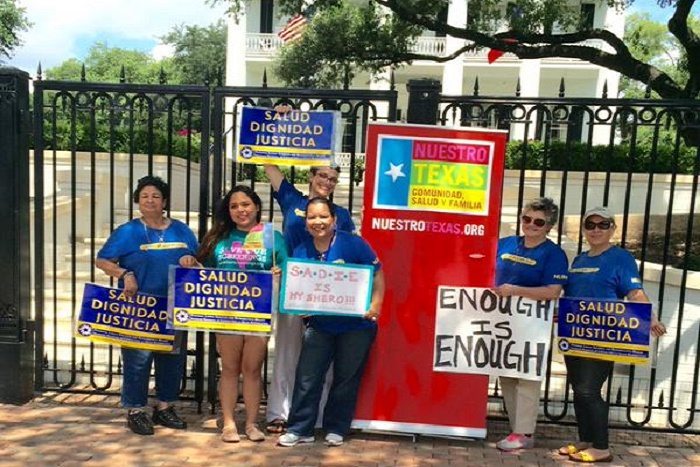Report: Texas Latinas ‘Disproportionately’ Harmed by 2015 Legislature
The report, part of NLIRH and CRR's Nuestro Texas series, details lawmakers' efforts to reduce access to reproductive cancer screenings, increase restrictions on abortion care for immigrant Texans and minors, and further militarize the border.

During the 2015 legislative session, Texas lawmakers enacted policies that will “disproportionately harm” low-income Texas Latinas and those living in rural and underserved areas, according to a legislative report released jointly by the National Latina Institute for Reproductive Health and the Center for Reproductive Rights.
The report, part of NLIRH and CRR’s Nuestro Texas series, details lawmakers’ efforts to reduce access to reproductive cancer screenings, increase restrictions on abortion care for immigrant Texans and minors, and further militarize the border, in addition to “failing to close the [Medicaid] coverage gap” and “decreasing medically accurate sexuality education.”
NLIRH was not entirely critical of the 2015 session. In the report, NLIRH gave restrained approval to a $50 million increase in health-care funding, though the report’s authors questioned how the money would be spent with little built-in legislative oversight and a public health department that’s currently undergoing significant restructuring:
Though we applaud the increase of $50 million, any women’s health and family planning programming, either under the current system or the proposed consolidation, needs a more substantial increase in funding to match the growing demand for publicly supported family planning services and supplies. In 2012, the first full year following the devastating cuts to family planning funding, Texas met only 13% of the need for publicly funded contraception—half what it had satisfied just two years earlier. And this need is not evenly distributed.
NLIRH also praised new legislative efforts to increase access to long-acting reversible contraception (LARCs), an issue that NLIRH specifically called on state lawmakers to address in the organization’s 2015 legislative “blueprint” released in January. Called “a positive step forward,” the state budget stipulation dedicated to training providers and educating the public about LARCs is reflective of, according to NLIRH, a “strong preference in the Latina community for LARC methods such as IUDs.”
But overall, the Nuestro Texas report paints a grim picture of the 84th legislature from the perspective of Texas Latinas.
According to the report, restrictions on sex education and stricter “abstinence-only policies disproportionately impact Latinas, who are less likely than white women to receive any formal instruction on methods of birth control before age 18.”
And the state’s newest anti-abortion law, HB 3994, contains an identification provision that could keep minors, Latinas, and others without government-issued photo identification from accessing legal abortion care:
Those lacking such forms of identification will be forced to procure it at risk of delaying critical and time-sensitive care. As such, this requirement will impact the most vulnerable communities including undocumented women, low-income women and survivors of human trafficking.
NLIRH also expressed concern about policies that, while not specifically dealing with reproductive health, nevertheless could affect Latinas’ ability to access care by increasing “racial profiling at federal checkpoints” for Latinas who need to travel to doctor’s appointments:
The increased militarization of the Texas border raises fear among immigrants about traveling outside their communities. Documentation by Nuestro Texas has found that the ubiquitous presence of border patrol agents and internal immigration checkpoints on Texas roads places additional obstacles to undocumented women seeking necessary health care. Undocumented women in South Texas are landlocked and cannot travel north to get the health care they may need due to internal immigration checkpoints.
The 2015 session was the first in which Texas Latinas officially organized through NLIRH to lobby lawmakers directly on their own behalf at the capitol, and NLIRH pledged in this most recent report to continue the work and “build a culture of resilience where women not only learn about reproductive health but also how to claim their human rights.”
